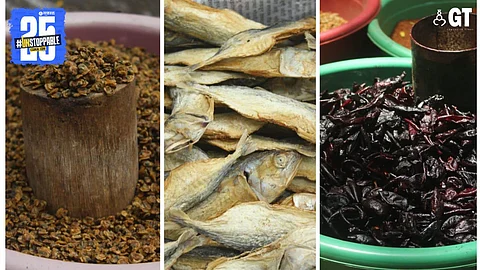

The early arrival of the monsoons has brought relief from the heat — and with it, the return of the age-old Goan tradition of purument, a seasonal practice rooted in culinary customs and cultural memory.
Originally a response to the heavy monsoon showers that made travel difficult and markets inaccessible, purument was about stocking up on essentials to sustain families through the season.
"The reason why we used to have purument was that the rains used to be very heavy, and moving out of the house was not as easy, unlike today. So, we used to buy most of the items, and store them at home so as to consume them during the rains," says 70-year-old Marcus Fernandes from Margao.
Although today’s conveniences, like supermarkets and refrigerators, have eliminated the need to stock ingredients, the tradition lives on as a celebration of Goan heritage.
The word, Purument, comes from the Portuguese word, provisão — meaning 'provisions' — and refers to this unique practice of monsoon preparedness, which is marked by summer fairs across Goa.
Fairs at the Holy Spirit Church in Margao and Our Lady of Immaculate Conception Church in Panjim bustle with shoppers looking for sukhi sungtam (dried prawns), dried fish, kokum, tamarind, jaggery, chillies, methi and more — locally sourced and deeply rooted in memory.
"We used to have a huge tamarind tree in our backyard, and before the monsoons, we would harvest it. My grandmother used to invite three or four of her favourite neighbours, and all of them would sit near a cross, next to my house and clean the tamarind," recalls Janice D'Souza, who now lives in Canada, but returns to Goa every summer to shop for her stock of purument.
"She would also harvest the kokum fruit, cut the peels and leave them to dry," she adds.
In the past, visiting these fairs was almost a family ritual. Back then, roads were lined with vendors selling local onions, beans, chillies and more. It was an event. Now, with modern retail and storage options, the urgency is gone — and with it, the tradition for the young generation of Goans.
Purument, at home, meant smart storage, too — like onions tied in bunches, or sausages smoked over a chulah.
Although today’s conveniences, like supermarkets and refrigerators, have eliminated the need to stock ingredients, the tradition lives on as a celebration of Goan heritage.
"Nowadays, there are stores, and people can buy their requirements from the markets, too. When I was a child, my mother used to have two to three bundles of onions tied into a bunch. The smoke from the chulah would keep the sausages from getting spoilt, and we would get to eat smoked sausages," says 68-year-old Margaret Fernandes from Dona Paula.
For families like Saliz Sequeira’s, group travel to the markets was a way to save money. "Dried fish was carefully stored in earthen pots, often layered with cashew leaves. Children weren’t just bystanders — they had their duties, too," he shares.
Today, however, much of that hands-on tradition is lost. With everything now just a click or call away, purument holds little meaning for the modern generation.
The rains themselves have changed, becoming less intense than decades ago. "Rainfall today is so different from the way it used to be in those days. As kids, we would love to watch our mother preparing a dish from the snails they would find in the fields. Now, there are no fields and no snails, either," says Freddy Baretto.
Seasonal lists varied — from rock salt and jackfruit seeds to tefla, sweet potato chips, alsande and sabudana sandge — often purchased at an affordable rate before the rains begin.
"My mother used to take us purument shopping to Margao. We used to buy salted fish and spices. These days, the purument fair has almost everything from clothes to even mobile covers," says 56-year-old Mathew Fernandes.
Besides the main fairs, Mapusa remains a major purument hub. "The Mapusa market is a hub for purument, where you can get everything at one go. People from all across Goa, and even abroad come to buy provisions," says Santana Mendonca, who has been a vendor there for over 60 years.
Salted seafood like mackerel, Bombay duck and prawns remain a staple. So does para (fish pickle), mole (prawn pickle), and seasonal pickles made from tendlim, brinjal, lime and carrot. Add to that local eggs, millets, vinegar, pulses — and you have a true purument spread.
It is this love for Goan ingredients that keeps the purument tradition alive to this day. Even in the face of rising prices, Goans still savour these seasonal favourites, each purchase a nod to heritage, memory, and flavour.